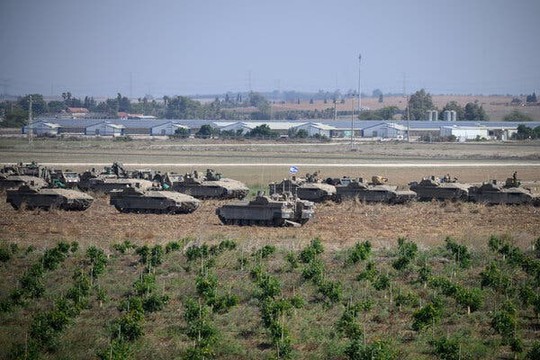Israeli military vehicles outside Sderot, near the Gaza border.
Photo: Getty Images
Israel has launched a military operation in the Gaza Strip. Now Israel may get a military response from Hamas's allies from other Arab countries. The situation is heating up. The New York Times analyzes the prospects for the confrontation.
If you care about Israel, you should be more worried than any other time since 1967. Back then, Israel defeated the armies of three Arab states — Egypt, Syria and Jordan — in what became known as the Six-Day War. Today, if you look closely, you’ll see that Israel is now fighting the Six-Front War, writes The New York Times.
This war is being fought by and through nonstate actors, nation-states, social networks, ideological movements, West Bank communities and Israeli political factions, and it is the most complex war that I’ve ever covered. But one thing is crystal clear to me: Israel cannot win this six-front war alone. It can win only if Israel — and the United States — can assemble a global alliance.
Unfortunately, Israel today has a prime minister, Benjamin Netanyahu, and a ruling coalition that will not and cannot produce the keystone needed to sustain such a global alliance. That keystone is to declare an end to the expansion of Israeli settlements in the West Bank and overhaul Israel’s relations with the Palestinian Authority so that it becomes a credible, legitimate Palestinian partner that can govern a post-Hamas Gaza and forge a broader two-state solution including the West Bank.
If Israel is asking its best allies to help the Jewish state seek justice in Gaza while asking them to look the other way as Israel builds a settlement kingdom in the West Bank with the express goal of annexation, that is strategically and morally incoherent.
It won’t work. Israel will not be able to generate the time, the financial assistance, the legitimacy, the Palestinian partner or the global allies it needs to win this six-front war.
And all six fronts are now hiding in plain sight.
First, Israel is fighting a full-scale war against Hamas in and around Gaza, in which, we can now see, Hamas still has so much residual capacity that it was able to launch a seaborne attack on Israel on Tuesday and on Wednesday fired long-range rockets toward Israel’s southern port city of Eilat and northern port city of Haifa.
Hamas’s dream has long been the unification of the fronts surrounding Israel, regionally and globally. Israel’s strategy has always been to act in ways to prevent that — until this Netanyahu coalition of ultra-Orthodox and Jewish supremacists came to power last December and began behaving in ways that actually helped foster the unification of the anti-Israel fronts.
Which leads to the second front: Israel against Iran and its other proxies. That is, Hezbollah in Lebanon and Syria, Islamist militias in Syria and Iraq and the Houthi militia in Yemen.
All of them in recent days have launched drones and rockets toward Israel or at U.S. forces in Iraq and Syria.
At the same time, Hezbollah came to realize that if Israel obliterated Hamas, as it declared it would, Hezbollah would be next. It would also be much weaker without Hamas draining energy and focus from Israel’s military. Therefore, Hezbollah decided that, at a minimum, it needed to open a low-grade second front against Israel.
The third front is the universe of social networks and other digital narratives about who is good and who is evil. When the world gets this interdependent, when — thanks to smartphones and social networks — nothing is hidden and we can hear one another whisper, the dominant narrative has real strategic value.
If Israel does invade Gaza, corporations everywhere will be facing competing demands from employees to denounce Israel or Hamas.
The fourth front is the intellectual/philosophical struggle between the international progressive movement and Israel. Some elements of that progressive movement, which I realize is big and diverse, have lost their moral bearings on this issue. For instance, we’ve seen numerous demonstrations on American college campuses that essentially blame Israel for the barbaric Hamas invasion, arguing that Hamas is engaged in a legitimate “anticolonial struggle.” These progressive demonstrators seem to believe that all of Israel is a colonial enterprise — not just the West Bank settlements — and therefore the Jewish people do not have the right either to self-determination or self-defense in their ancestral homeland, whether it’s within post-1967 borders or pre-1967 ones.
The fifth front is inside Israel and the occupied territories. In the West Bank, right-wing Jewish settlers are attacking Palestinians, while disrupting the efforts of Israel’s military to keep a lid on it in collaboration with the security forces of the Palestinian Authority, led by Mahmoud Abbas. We must remember that the P.A. has recognized Israel’s right to exist as part of the Oslo accords. It would be terrible if that front explodes into a confrontation between the P.A. and Israel, because then there would be scant hope for ever enlisting the authority’s help in governing Gaza.
The sixth front is inside Israel itself, mostly between its Jewish citizens. That front has been papered over for the moment, but it lurks just beneath the surface. It is the clash driven by Netanyahu’s enduring political strategy at home: divide and rule. He has built his whole political career on pitting factions of Israeli society against one another, eroding the kind of societal unity that is essential to win the war.
How do you win a six-front war? Only with a coalition of people and nations who believe in democratic values and the right of self-determination for all people. Until and unless Israel generates a government that can generate that coalition, it will not have the time, the resources, the Palestinian partner and the legitimacy it needs to take down Hamas in Gaza, concludes ‘The New York Times’.
read more in our Telegram-channel https://t.me/The_International_Affairs

 10:05 28.10.2023 •
10:05 28.10.2023 •























